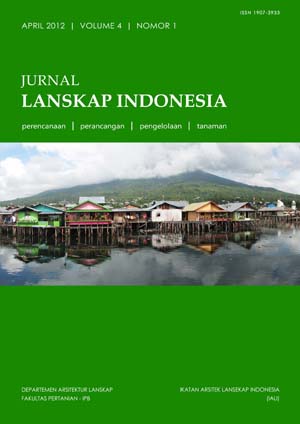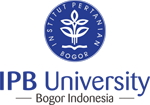LANSKAP KOTA MALANG SEBAGAI OBYEK WISATA SEJARAH KOLONIAL
Abstract
Malang City has colonial city character which is represented in spatial layout, buildings and landscapes. These characteristics are potential as historical objects as attempt to give knowledge to people about the history of Indonesia, particulary of
Malang City. Tourism activities also provides added value in preserving the historic landscape in the city. This study aims to identify the elements of residential landscapes, parks and streets associated withthe colonial history in Malang City, and
analyze the potential of tourism attraction based on the socio-cultural and aesthetic value.
The study was conducted in several residential areas, parks and main streets of Malang City, ie: a) East-West lines, include: Alun-alun Tugu, Kahuripan Street, Semeru Street, Ijen Street and Ijen Parks; and b) North-South lines include: Suprapto Street, Basuki Rahmat Street, Alun-alun Merdeka, Alun-alun Merdeka Park, Kauman residential and Chinatown. Data analysis includes 3 (three) stages: 1) assessment of landscape in terms of socio-cultural aspects, 2) assessment of landscape
in terms of aesthetics using scenic beautyestimation method, 3) determination of tourism potential of the colonial history. Based on analysis of socio-cultural aspects, Ijen resident is the highest socio-culturalvalue and the lowest is Kahuripan Street.
While based on analysis of aesthetic aspect, the highest value is landscape of Alun-alun Tugu Park and the lowest is Chinatown. Based on the overlay of socio-cultural and aesthetic value, it is obtained that the Alun-alun Tugu Park has the highest value that can be the primary destinations in the development of Malang City colonial historical tourism.
Downloads
This journal permits and encourages authors to post items submitted to the journal on personal websites or institutional repositories both prior to and after publication, while providing bibliographic details that credit, if applicable, its publication in this journal. However, after the article is submitted and published in this journal, it is fully copyrighted by the Jurnal Lanskap Indonesia or JLI. If excerpts from other copyrighted works are included, the author must obtain written permission from the copyright owner and give credit to the source in the article. Then, the writer or reader is allowed to copy, share, and redistribute articles/material in any form. But it must still include the appropriate source and credit because the article in this journal is licensed by Creative Commons Attribution 4.0 International License (CC BY 4.0).
I. Proposed Policy for Journals That Offer Open Access
Authors who publish with this journal agree to the following terms:
- Authors retain copyright and grant the journal right of first publication with the work simultaneously licensed under a Creative Commons Attribution License that allows others to share the work with an acknowledgement of the work's authorship and initial publication in this journal.
- Authors are able to enter into separate, additional contractual arrangements for the non-exclusive distribution of the journal's published version of the work (e.g., post it to an institutional repository or publish it in a book), with an acknowledgement of its initial publication in this journal.
- Authors are permitted and encouraged to post their work online (e.g., in institutional repositories or on their website) prior to and during the submission process, as it can lead to productive exchanges, as well as earlier and greater citation of published work (See The Effect of Open Access).
II. Proposed Policy for Journals That Offer Delayed Open Access
Authors who publish with this journal agree to the following terms:
- Authors retain copyright and grant the journal right of first publication, with the work after publication simultaneously licensed under a Creative Commons Attribution License that allows others to share the work with an acknowledgement of the work's authorship and initial publication in this journal.
- Authors are able to enter into separate, additional contractual arrangements for the non-exclusive distribution of the journal's published version of the work (e.g., post it to an institutional repository or publish it in a book), with an acknowledgement of its initial publication in this journal.
- Authors are permitted and encouraged to post their work online (e.g., in institutional repositories or on their website) prior to and during the submission process, as it can lead to productive exchanges, as well as earlier and greater citation of published work (See The Effect of Open Access).



























